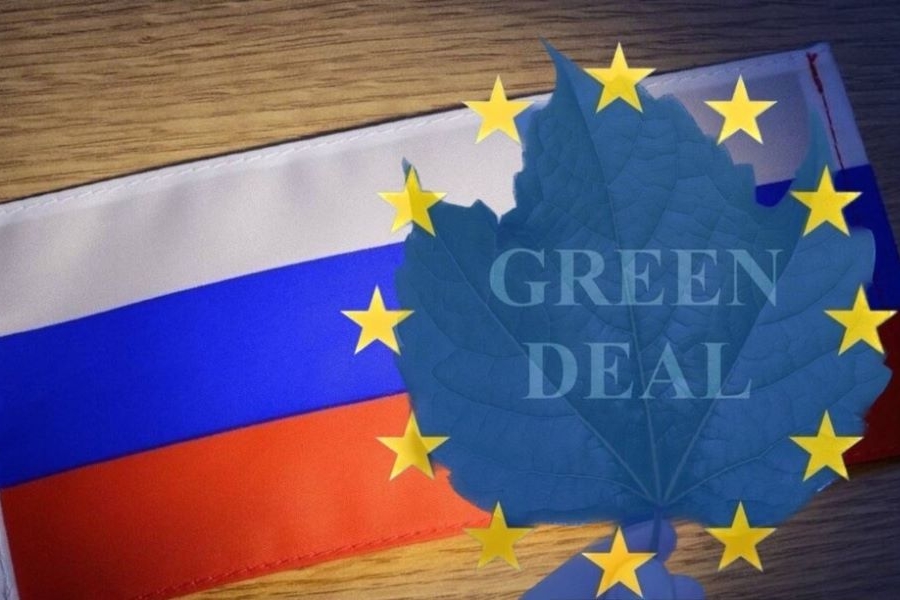

Russian campaigns for spreading disinformation and fake news have not spared the topic of climate change either. In their latest campaign, the Kremlin attempted to undermine Western efforts to address these issues by portraying them as a futile policy of cutting off Russian gas and launching colonial attacks on Africa to satisfy hostile economic needs. They claim the West invented the climate "hoax" to hinder Russias economic development.
Information published by the East asserts that Western countries use environmental regulations to harm their economic competitors. They even demonize Greta Thunberg and call environmentalism "green madness."
However, it appears that state-controlled Russian media recognizes that simultaneously promoting conspiracy theories and allegations while targeting those who genuinely believe them could alienate regular readers. In practice, this means that many articles that are opened in a new tab while reading on internet portals about this topic, which target international audiences, such as "Russia Today" in English and accept the scientific consensus that climate change is still occurring, pose a challenge to the Russian disinformation apparatus. Yet, Russian propagandists also use this acceptance as another weapon to attack the West.
As the “EU-Disinfo” portal reports, Russian state media and their "supporters" have adopted a typically flexible and opportunistic approach in reporting on climate change. They claim that Western governments - especially EU governments - are corrupt, hypocritical, incompetent, or neo-colonialist and attempt to solve the problem this way. They also argue that any transition of the EU to renewable energy can only happen by importing Russian gas. Alongside all of this, arguments from Russian-language media still regard climate change as "another deceptive Western trick."
The overarching narrative of disinformation that underlies the primary distortion of facts about climate change is one that the Kremlin most commonly employs. Its the false claim that the "West is corrupt" in every sense of the word - morally, politically, and economically. This narrative is then used to contrast Russia and the West, depicting the former as the protector of all that is good and decent.
This manipulative tactic mainly targets African countries, as evidenced by pro-Kremlin disinformation surrounding the recent Africa-Russia summit. State-controlled Russian media assert that by adopting EU environmental standards, the Europeans are not trying to combat climate change. Instead, they argue that Europeans want to stifle Africas economic development or reap benefits from such action.
As is typical of conspiracy theories, these narrative lacks evidence. Instead, its a presumption built on faulty ideas and politics. The alleged conspirators are not meant to come out looking good. The Kremlins goal benefits from being able to rely on the often-destructive legacy of European colonialism in Africa to falsely claim that, since some European countries performed poorly in the past, all EU countries will undoubtedly perform poorly again.
One cited example is a Russian politician claiming that Western environmental protection measures are part of a "guerrilla war" against Russian oil producers and that "ecologists are in this war from the beginning." Additionally, an article in Sputnik quotes a Russian diplomat asserting that the West is "imposing green loans" on African governments to prevent genuine industrialization of African nations. According to the Russian politician, the solution to this problem lies only with the help of Russia. Or, as stated by a Russian official, "Russia can offer credible alternatives" for renewable energy sources, such as "its nuclear expertise."
Indeed, the cooperation between Africa and the EU is only strengthening. For example, the Africa-EU Green Energy Initiative aims to provide access to electricity for 100 million Africans by 2030, contributing to the development of 50 gigawatts of renewable energy production. To achieve this, the EU is attempting to allocate 15 billion euros from Union public institutions and private investors for renewable energy sources, energy efficiency, and related projects, amounting to 3.2 billion euros, funds that will come from direct EU grants. And most importantly, this initiative is, of course, entirely voluntary. For this project and others in this field, European leaders often emphasize that they are strengthening the ties between the EU and Africa.
The EU has recently launched a web portal aimed at pedagogical expertise for combating disinformation and promoting digital literacy. This portal focuses on enhancing the critical thinking skills of young people in the EU, seeking to bolster their resilience in the face of digital world disinformation.
Initially published in English in October 2022, these EU guidelines provide pedagogical expertise on strengthening the critical thinking skills of young individuals to foster their resistance to disinformation in the digital realm.
The objective is to cultivate a broader understanding of digital literacy through education and training, encourage responsible and safe use of digital technologies, and stimulate greater public awareness and knowledge regarding disinformation.
In all societies there are issues that are rather being skipped. Certain...
The neoliberal path, started in 2001, has led to especially bad results in Serbi...
For centuries, the region was subsumed within the Ottoman and Hungarian Empires,...
"Serbia has returned to the systemic and anti-systemic position of the political...
In reality, Serbia is closer than ever to NATO. In the course of the last five y...